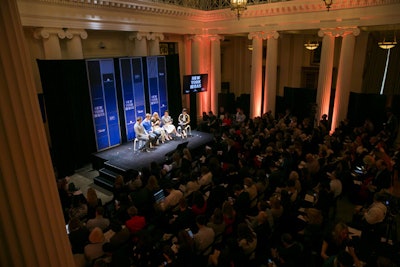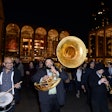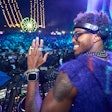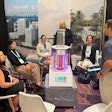
Chad Kaydo (@ChadKaydo) is BizBash’s former editor in chief and the founder and editor of The X Letter, a website and newsletter about experiences, brands, and culture. Chad’s column appears biweekly.
Last week The Atlantic announced a new president for its event division, AtlanticLive, which produces more than 100 events across the country and has become a model for publishers looking to build revenue streams outside of traditional advertising.
AtlanticLive runs large conferences like the Aspen Ideas Festival and smaller forums and dinners; it brings in nearly 20 percent of The Atlantic’s revenue, and has seen a 37 percent increase in event revenue in the first half of the year.
The new chief is Margaret Low Smith, who arrives from NPR, where she ran a division of nearly 400 journalists as its senior vice president for news. She started at NPR 32 years ago as an overnight production assistant and later produced stories on chicken catchers and mentally ill homeless people before becoming head of programming.
Smith’s new team will include staffers handling event content, sponsorships, and logistics. Her predecessor, Elizabeth Baker Keffer, founded the division after working on the business side of The Atlantic as chief marketing officer and publisher. So it’s worth noting that Atlantic Media chairman and C.E.O. David Bradley didn’t hire someone with a background in ad sales, marketing, or event management.
“Our events platform is an expression of our journalism, just like our print and digital platforms,” Atlantic president and C.O.O. Bob Cohn said via email. “So we're thrilled to welcome to AtlanticLive a newsroom veteran like Margaret, who understands the high product and editorial standards we strive to meet every day, and whose leadership and experience will drive our events business to new heights.”
Smith is one of many journalists moving from more traditional roles in print, web, and broadcast outlets to what some call “live journalism.”
Media companies have long looked to their editorial staffs to help curate conference speakers and event topics. Now, as many publishers are revamping their event strategies to bring in more revenue and launching ambitious new programs (a trend I covered recently), companies are giving editors more formal event-related responsibilities.
Some publications have editors chair or host events in addition to their regular duties, while others are creating roles dedicated fully to event programming. And some high-profile journalists have gone out on their own, creating enterprises around live journalism.
When Tina Brown—famous for her years as editor in chief of Vanity Fair and The New Yorker—left the Daily Beast last year, she took its event department and its signature event, the Women in the World conference, and launched Tina Brown Live Media.
Earlier this year, Kara Swisher and Walt Mossberg, who founded the conference and blog All Things Digital for The Wall Street Journal, went out on their own to start the tech news site Re/code and the Code Conference. After their first conference, held in May, sold out in a matter of hours, they made BizBash’s list of the most innovative people in events. (Brown did too.)
David Kirkpatrick, a former technology editor for Fortune, started Techonomy, a conference and media company, in 2011. Caroline Waxler, who has written for Forbes and Business Insider, launched a conference for bloggers at Lucky and was the director of Internet Week New York in 2013. Through her company, Harkness Hall, she also helps media brands develop new conferences.
Journalists aren’t just working in media events: Jeremy McCarter, previously a senior writer at Newsweek and the theater critic at New York magazine, is now director of the Public Forum, a series of readings and discussions produced by the Public Theater that incorporates performers as well as scholars, journalists, and authors. (Last month McCarter directed an evening of readings and songs related to Shakespeare in America with the likes of James Earl Jones, Alec Baldwin, and E. L. Doctrow.)
“I think it’s added a level of intelligence to the programs being offered,” says Robert Bierman, who became general manager of Washington Post Live, the newspaper’s event division, in May. Previously he ran editorial events for Bloomberg L.P. and the Fortune/Money Group at Time Inc. His background is in event logistics, not content, and at The Post, he reports to the business side of the paper, and Mary Jordan, a Pulitzer Prize-winning journalist, runs the content and reports to the newsroom.
Experienced journalists can bring storytelling skills, connections to potential speakers and panelists, and knowledge of a conference’s subject matter. They can also help conceive live content that can be repurposed and adapted to other formats—stories, videos, social media—to amplify and extend the impact of an event. With training and practice, some can be strong on-stage interviewers and hosts.
(These folks are no dummies, too: While magazines are investing in events, many are laying off staffers in other roles.)
Journalists are also trained to think for an audience. “As people launch a new conference and get into the business, the danger is they spend too much time considering the sponsor/advertiser part of the equation and forget to consider whether or not there is an audience or a subject that deserves an audience," Bierman says. Putting a journalist in charge should keep the enterprise focused on the product.
The tricky part of these changing roles can be translating longstanding journalism ethics rules to this new platform. Some are pretty straightforward: While many conferences sell speaking slots to sponsors, “that’s an absolute no-no for media conferences,” Bierman says. (Still, it happens, sometimes with an explanation, sometimes not.)
At some publications, editorial staffers recommend speakers to the event team but don’t actually invite them to speak, to avoid asking for something from a source they cover. In 2012 The New York Times public editor Margaret Sullivan wrote that the paper’s first DealBook conference made her “queasy,” suggesting that The Times was indebted to the high-profile businesspeople appearing on stage and luring attendees to buy $1,500 tickets.
The Times conference division is run by Gerald Marzorati, a former editor of The New York Times Magazine. On his LinkedIn page, he says, “Ultimately, I am responsible for figuring out who is on stage talking about what, as well as meeting revenue goals. It’s like being editor and publisher. It’s a great challenge.”
That will also be the new challenge for Smith at AtlanticLive. The size of her division (Digiday estimated it at $10 million this week) and its reputation as an industry leader will have others paying attention to how a journalist does running a large, established event business.
“The reason it’s interesting is it’s sort of the first high-profile example of this,” Bierman says. “I think people will watch closely what happens.”



















